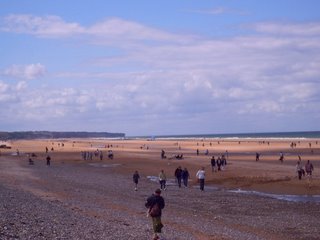What's this, I hear you cry, two posts in the space of 24 hours? Yes, I'm afraid I couldn't stop myself from posting, having heard today about Richard Dawkins's new book, The God Delusion. This book apparantly sets out to show that God does not exist, and that religion is a negative thing. Having read some extracts of the book on the BBC website, it seems to me that it's more anti-theist rambling, but I'll reserve judgment until I've read the whole thing.
I will, however, address one point which Dawkins makes, and which is a particular bugbear of mine. He discusses at length the favourite charge levelled at religion, namely that it "always leads to violence". In the present climate, it is not difficult to see why, with the threat of so-called "Islamist terror" ever-present. In the recent past, conflicts between Protestants and Catholics in Northern Ireland and between Palestinians and Jews in Israel have also given rise to such claims. I would argue, however, that far from being the cause of such strife, religion is the easy scapegoat. These conflicts are almost exclusively concerned with ownership of land or other economic resources, and have little if anything to do with the religious orientation of the groups involved.
More convincing, however, is to consider an overview of the twentieth century's major wars. The Great War was caused by an arms race, and had nothing to do with religion; the Second World War was caused by the all-consuming egotism of Adolf Hitler, who was to all intents and purposes an atheist. The Vietnam War was about political ideology, as were the Korean and Afghan wars. The Balkan conflict principally concerned ethnicity and the egos of the principle players. The First Gulf War was, again, prompted by the ego of Saddam and the response from the West in defending its economic interests. Indeed, the man responsible for more deaths than any other person in the 20th century, Josef Stalin, was an atheist who acted solely out of self-interest in order to maintain himself in power and grow the cult of his personality.
Faced with these facts, it seems somewhat outrageous to claim that religion is a major source of conflicts. It seems to me that the major source of killing and destruction in the past 100 years has been through individuals turning away from God and embracing the cult of their own ego. Ultimately, it is human failing that provokes war, not religion; the last century, which saw more human suffering than any previous, shows us that.
One final point - having discussed the religion/war claim in such detail, it occurs to me that there is a certain weakness in the overall purpose of arguments which attack religion on these grounds. By concentrating on this topic, Dawkins and others are seeking to undermine faith on the basis of its effects, and possibly the character of the various religions. They never seek to tackle the truth which underpins faith - and when they do, it is with bland statements such as "there's no evidence for a God".
If I were to take such an approach to one of 20th century science's greatest achievements, namely the discovery of the atom, I would point out that
a) I've never seen one, and I only have the word of various scientists for its existence (all of whom have a vested interest)
b) Within a very short time of the atom's "discovery", its name had been used to unleash the most destructive man-made forces ever - namely the atomic bombs which destroyed Hiroshima and Nagasaki
c) This "atom" still threatens us today, being present in the many hundreds of nuclear power stations across the West. These will all have to be decommissioned, at a huge cost - most of which will be spent on employing, er, scientists.
On this basis, science is a terribly bad thing and we should stop spending huge quantities of cash on scientists.
Ok, so I'm being slightly fascetious, but I hope you get the point. Science should not be quarreling with religion, it should be working with good Christian people to find solutions to the world's problems. Ultimately, Dawkins and his ilk can ramble on forever about how terrible religion is, but it's not going to stop me believing, and it certainly won't prevent me from trying to make this world a better place.
I will, however, address one point which Dawkins makes, and which is a particular bugbear of mine. He discusses at length the favourite charge levelled at religion, namely that it "always leads to violence". In the present climate, it is not difficult to see why, with the threat of so-called "Islamist terror" ever-present. In the recent past, conflicts between Protestants and Catholics in Northern Ireland and between Palestinians and Jews in Israel have also given rise to such claims. I would argue, however, that far from being the cause of such strife, religion is the easy scapegoat. These conflicts are almost exclusively concerned with ownership of land or other economic resources, and have little if anything to do with the religious orientation of the groups involved.
More convincing, however, is to consider an overview of the twentieth century's major wars. The Great War was caused by an arms race, and had nothing to do with religion; the Second World War was caused by the all-consuming egotism of Adolf Hitler, who was to all intents and purposes an atheist. The Vietnam War was about political ideology, as were the Korean and Afghan wars. The Balkan conflict principally concerned ethnicity and the egos of the principle players. The First Gulf War was, again, prompted by the ego of Saddam and the response from the West in defending its economic interests. Indeed, the man responsible for more deaths than any other person in the 20th century, Josef Stalin, was an atheist who acted solely out of self-interest in order to maintain himself in power and grow the cult of his personality.
Faced with these facts, it seems somewhat outrageous to claim that religion is a major source of conflicts. It seems to me that the major source of killing and destruction in the past 100 years has been through individuals turning away from God and embracing the cult of their own ego. Ultimately, it is human failing that provokes war, not religion; the last century, which saw more human suffering than any previous, shows us that.
One final point - having discussed the religion/war claim in such detail, it occurs to me that there is a certain weakness in the overall purpose of arguments which attack religion on these grounds. By concentrating on this topic, Dawkins and others are seeking to undermine faith on the basis of its effects, and possibly the character of the various religions. They never seek to tackle the truth which underpins faith - and when they do, it is with bland statements such as "there's no evidence for a God".
If I were to take such an approach to one of 20th century science's greatest achievements, namely the discovery of the atom, I would point out that
a) I've never seen one, and I only have the word of various scientists for its existence (all of whom have a vested interest)
b) Within a very short time of the atom's "discovery", its name had been used to unleash the most destructive man-made forces ever - namely the atomic bombs which destroyed Hiroshima and Nagasaki
c) This "atom" still threatens us today, being present in the many hundreds of nuclear power stations across the West. These will all have to be decommissioned, at a huge cost - most of which will be spent on employing, er, scientists.
On this basis, science is a terribly bad thing and we should stop spending huge quantities of cash on scientists.
Ok, so I'm being slightly fascetious, but I hope you get the point. Science should not be quarreling with religion, it should be working with good Christian people to find solutions to the world's problems. Ultimately, Dawkins and his ilk can ramble on forever about how terrible religion is, but it's not going to stop me believing, and it certainly won't prevent me from trying to make this world a better place.



